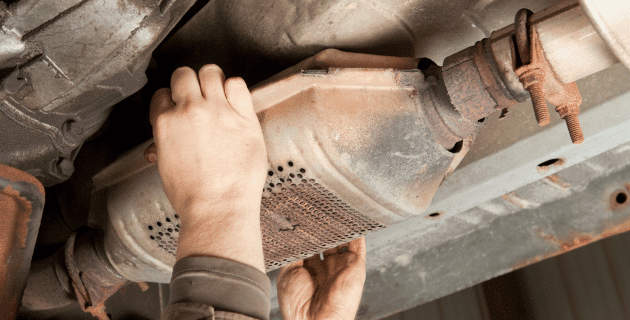You’ve probably heard of someone stealing a catalytic converter, but never thought it could happen to you in your neighborhood. Well, think again…
The number of catalytic converter thefts reported in insurance company claims has greatly increased over the past three years, and the National Insurance Crime Bureau estimates that these thefts increased by 1,215% between 2019 and 2022. Stolen catalytic converters can garner anywhere from $20 to $350 on the black market, with the replacement cost to vehicle owners averaging over $2,500 according to the National Automobile Dealers Association.
What are catalytic converters?
Catalytic converters are part of your car’s exhaust system. They turn harmful emissions into harmless gases. These essential car parts contain precious metals like platinum, palladium or rhodium, which can be worth hundreds to thousands of dollars when sold to scrap yards. Catalytic converters are especially attractive to thieves because they are not easily tracked. Plus, they can be removed from your vehicle in a matter of minutes.
What vehicles are thieves targeting?
Any car manufactured after 1974 has a catalytic converter, and is a potential target. However, thieves often look for taller vehicles like pickup trucks or SUVs because they can slide underneath them more easily. They also look for hybrids, which have a greater supply of those precious metals in their catalytic converters. The only vehicle without a catalytic converter is an electric vehicle (EV).
What steps can you take to prevent a theft?
You want to make it more difficult for thieves to steal your catalytic converter, and harder for them to profit if they do. Here are some of the most popular ways to help prevent a theft.
Keep things well-lit and secure.
For thefts that occur at night, keeping your property lit up could be a deterrent. Install motion sensor lights in your driveway which could surprise a thief and potentially scare him away. A home security system with visible cameras also can help prevent thefts.
Park in the right place.
Park in your locked garage if you have one, or in your driveway. Avoid street parking that is beyond the scope of your security cameras. If you’re in a public space, choose the first row of parking spaces near the building. These are generally the ones that are well lit and covered by the building’s security camera. They have the added advantage of being the places where people are most likely to pass by.
Pro Tip: For cars with lower clearances, you might find that parking on hills, gravel or uneven surfaces can help make it harder for thieves to get underneath. They may pass by your car for a converter on another vehicle that’s easier to reach.
Mark your converter.
Etch your car’s VIN or license plate number onto your catalytic converter. This will help alert scrap dealers that it’s a stolen part. While thieves could file off the etching, the filing marks will still be noticeable. Alternatively, paint your catalytic converter a bright color. It’s unsellable in that condition; thieves will have to clean off the paint, which is a time-consuming process. They may decide not to bother with your catalytic converter and look elsewhere.
Install an anti-theft device.
Aftermarket devices can be installed that make it difficult or impossible to remove a catalytic converter. These include cages, panels and shields. You can weld the bolts of your converter so they cannot be turned. You also can weld your converter in place. Add a warning sticker on your vehicle’s window saying that your car has an anti-theft device. Thieves will see it and take notice.
Add an alarm.
You can install a motion sensor alarm that will go off if someone is using a vibrating power tool on your car. It’s easy to install. The downside is that it’s also easy to remove, and so it may not be the deterrent you want.
Start a neighborhood watch group.
Catalytic converter theft is often a crime where a whole neighborhood is targeted on a single night. Forming a neighborhood watch group will help prevent a series of thefts. Set up a text chain and share information from your doorbell and security cameras. Report suspicious behavior, such as unknown cars circling the block. If you see someone tampering with vehicles on your street, report it immediately to the police—and alert your neighbors.
How do you know if your converter is stolen?
You don’t have to know cars to know when your catalytic converter is stolen. You’ll hear it as soon as you start your car. It will make a loud roar which will become even louder when you accelerate. Your car also may sputter. It will not drive smoothly. You may notice an increase in exhaust and/or exhaust smells. The check engine light may go on. The theft may have been silent and secretive, but the aftermath is not.
The cost to replace a catalytic converter can be pricey, but if you have comprehensive insurance for your vehicle, that will help to cover the replacement part, after the deductible has been met. Make sure that your auto insurance policy is up to date and that you are fully covered should anything happen.
This article is furnished by California Casualty, providing auto and home insurance to educators, law enforcement officers, firefighters, and nurses. Get a quote at 1.866.704.8614 or www.calcas.com.
- Graduation – When to Remove Your Child from Your Auto Policy - May 18, 2023
- How to Prevent Catalytic Converter Theft - May 17, 2023
- How Much Does Home Insurance Cost? - May 17, 2023

